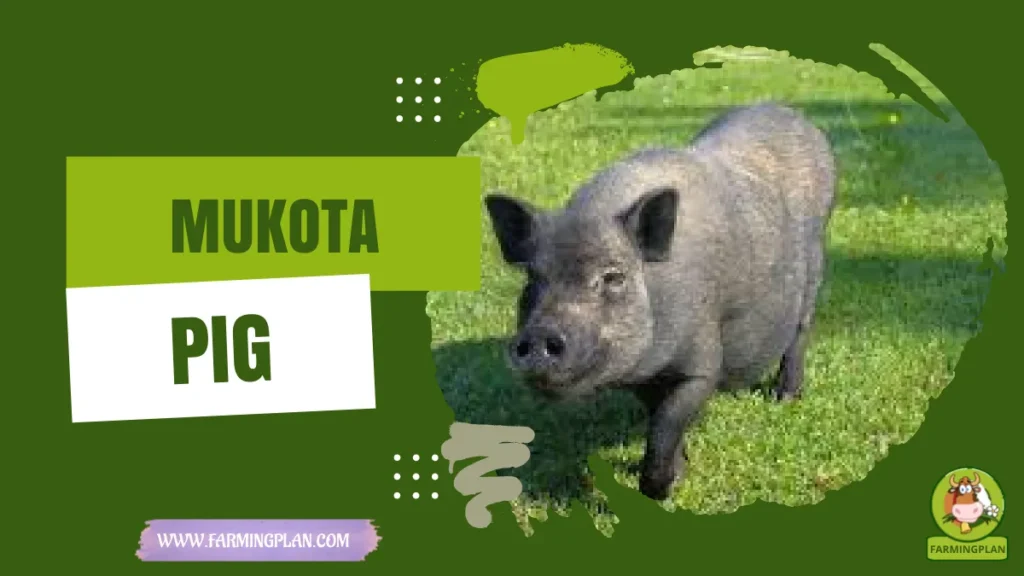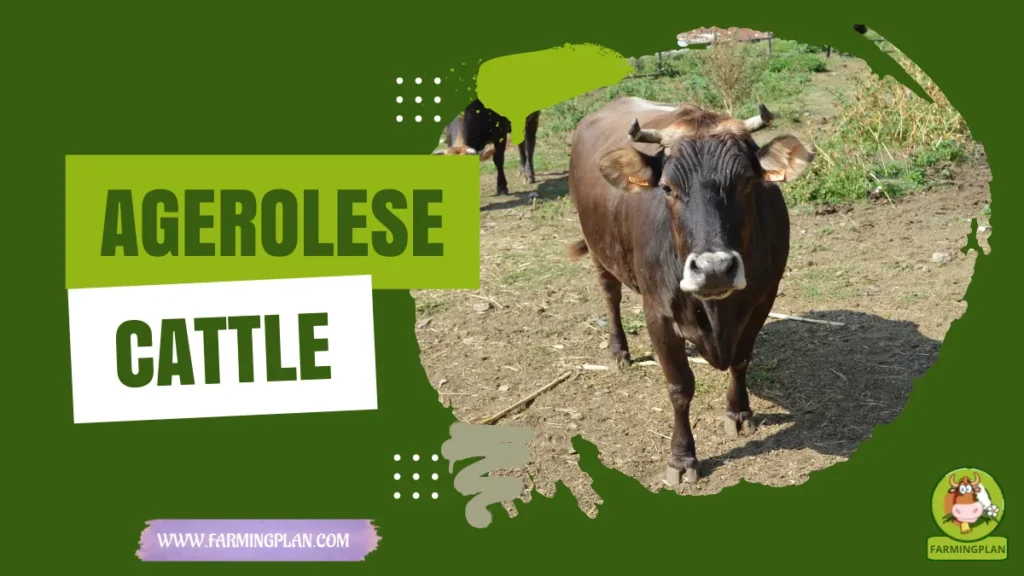The American Chinchilla Rabbit is one of the most beautiful rabbit breeds you’ll ever come across. With its plush, chinchilla-colored coat and calm personality, this rabbit has charmed pet owners, breeders, and farmers alike. Originally developed for the fur and meat industries, it has found a new place in modern homes as a lovable pet and a standout show rabbit. Whether you’re raising rabbits for your homestead or just want a friendly, fluffy companion, the American Chinchilla offers a perfect mix of personality, size, and low-maintenance care. Let’s hop in and learn all about this amazing breed.
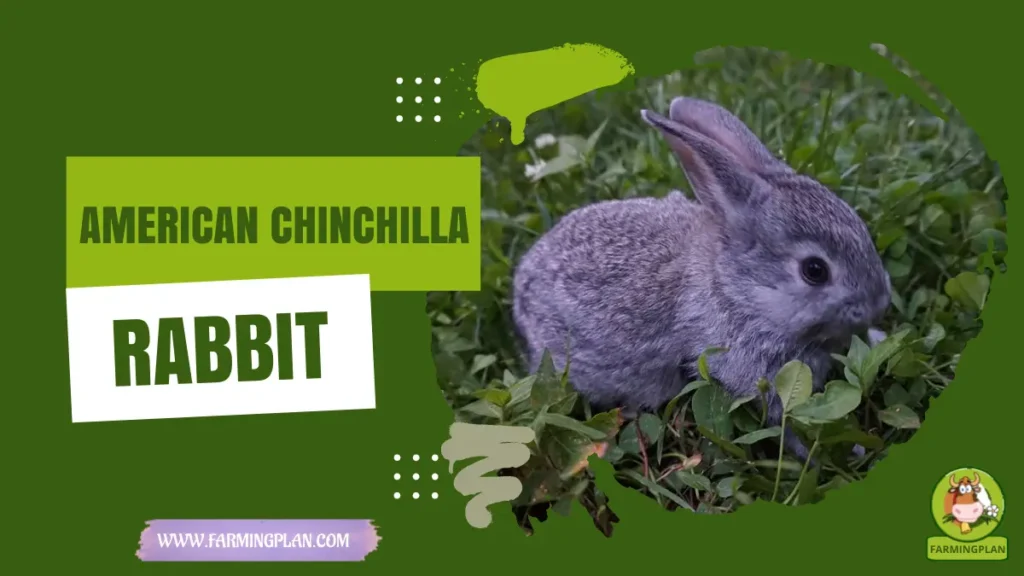
History & Origin
The American Chinchilla Rabbit got its start in the early 20th century, right when the demand for high-quality rabbit fur was booming. Breeders in the U.S. wanted a rabbit that had a denser body than the original Standard Chinchilla. Through selective breeding, they created a larger version with a more commercial body type, ideal for both fur and meat production.
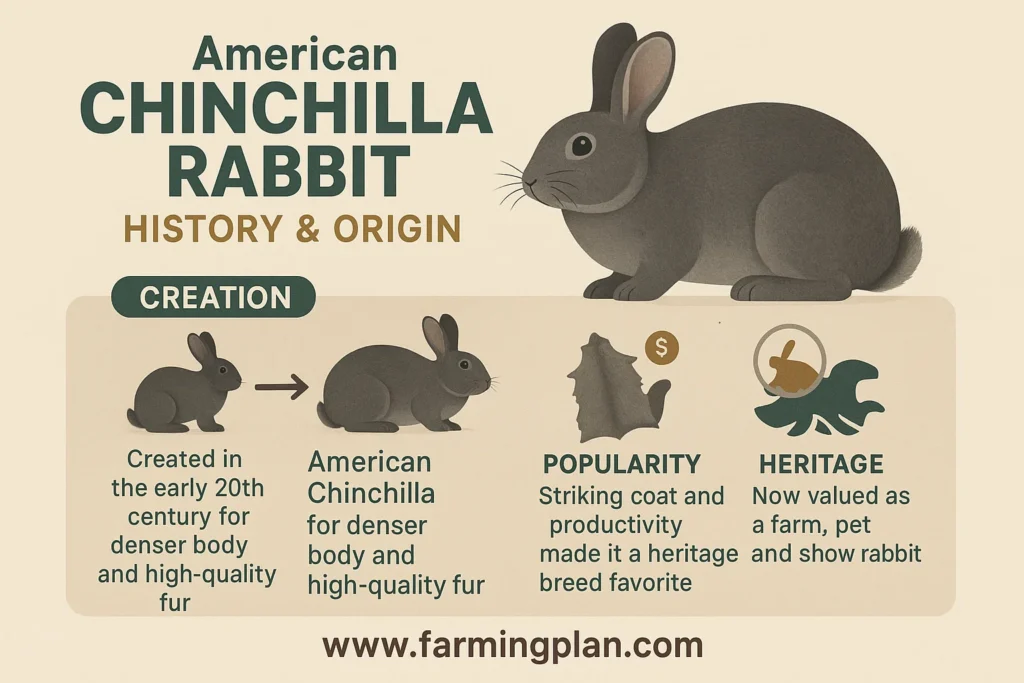
This new breed quickly made an impact with rabbit keepers. It was not only more productive but also retained the striking chinchilla-colored coat people loved. Recognized for its value, the American Chinchilla became a favorite among heritage breeds. Over time, as the rabbit fur industry declined, the breed’s purpose shifted. Breeders and rabbit lovers kept the tradition alive. Thanks to the efforts of organizations like the American Chinchilla Rabbit Breeders Association, this rabbit still thrives today — not just as a farm animal, but also as a well-loved pet and show rabbit.
Read More: English Spot Rabbit: The Charming Bunny That Steals Hearts
Characteristics
The American Chinchilla Rabbit stands out for its plush coat and sturdy body. It has a commercial body type, meaning it’s broad, muscular, and built for both meat and fur production. Most adults weigh between 10–12 pounds, making them one of the larger rabbit breeds without being overwhelming for pet owners. They typically live for 5-10 years, so be prepared for a long-term commitment when bringing one into your home.
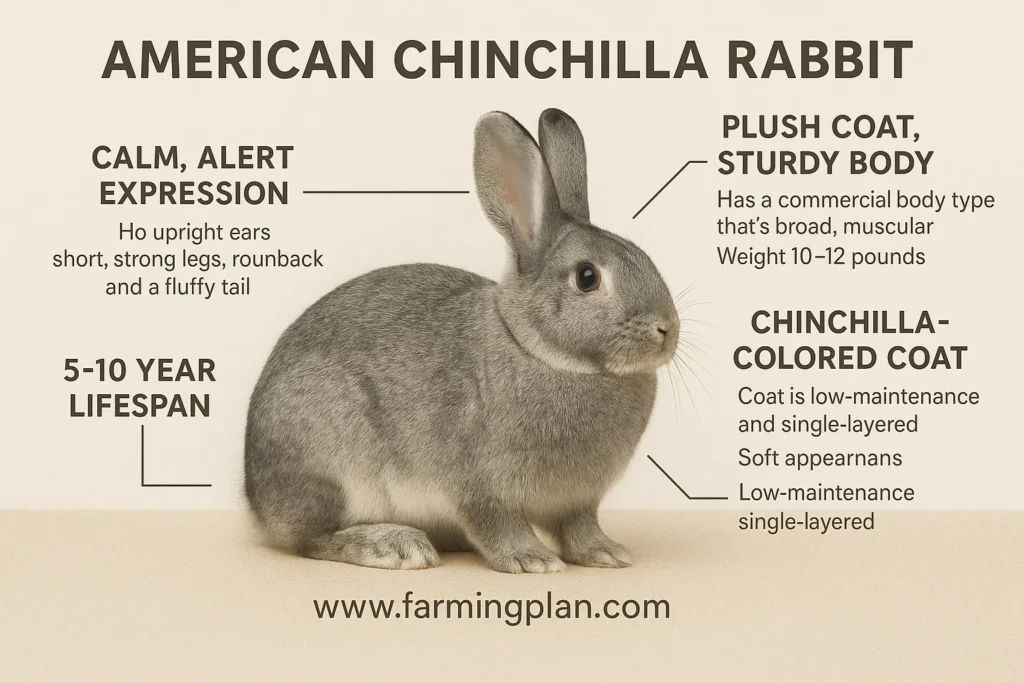
One of its most striking features is the chinchilla-colored coat. This coat isn’t just gray—it has distinct bands of color that give it a shimmering, soft look. These bands run across each hair shaft and create a natural glow that’s unique to chinchilla rabbits. The coat is low-maintenance and single-layered, so you won’t need to worry about matting or daily grooming.
The rabbit’s ears stand upright, and its face has a calm, alert expression. Its short, strong legs and rounded back give it a balanced, stocky appearance. With its thick fur, gray color, and fluffy tail, this breed looks like a cross between a wild rabbit and a standard fluffy gray pet.
Read More: Cashmere Lop Rabbit: The Ultimate Adorable and Devoted Pet
Nature & Temperament
The American Chinchilla Rabbit is known for its calm and gentle nature. This breed has a naturally docile temperament, which makes it an ideal choice for families, first-time rabbit owners, and anyone who wants a peaceful companion.
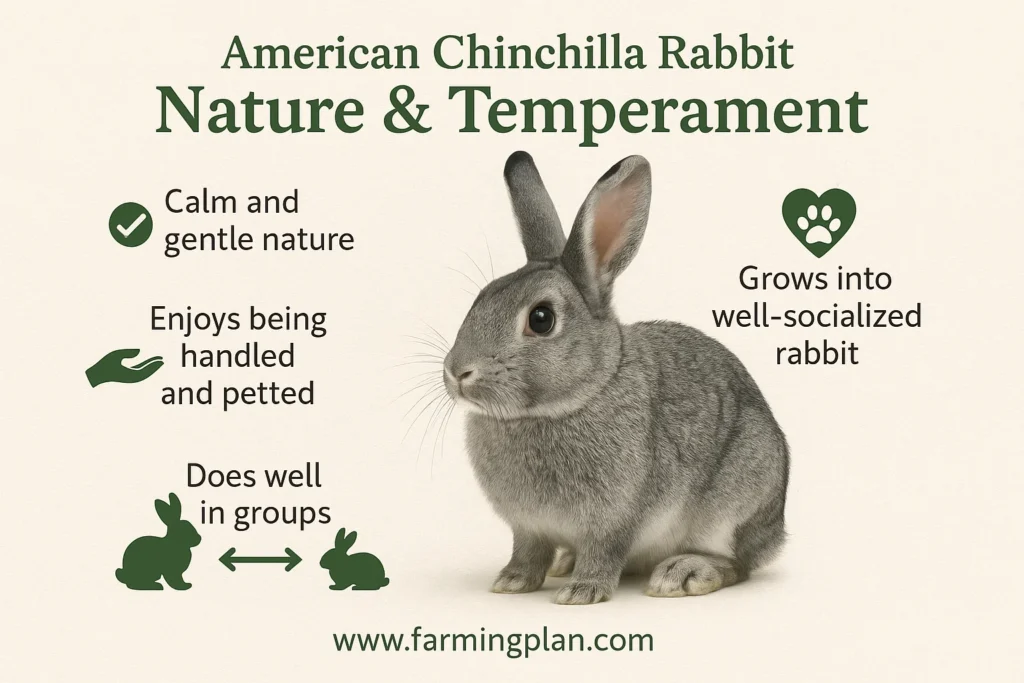
These rabbits love human interaction and enjoy being gently handled and petted. They don’t mind cuddles, but they also appreciate having time to explore on their own. When raised in a social setting, they grow into well-socialized rabbits that get along well with both people and other pets. Farmers and breeders also appreciate their easygoing personality, especially when using them in colony-raising setups. They aren’t aggressive and tend to do well in groups if introduced properly.
Read More: Lionhead Rabbit Care Guide: Raise A Happy, Healthy Bunny
Food & Diet
Feeding your American Chinchilla Rabbit the right way keeps it happy and healthy. A good diet starts with unlimited hay. Hay helps their digestion and keeps their teeth from growing too long. Add in high-quality rabbit food pellets that are rich in fiber and nutrients. Fresh veggies like romaine lettuce, cilantro, and carrots make great treats, but serve them in small amounts. Avoid sugary fruits or anything with added salt. A poor diet can cause serious health problems, so stick to foods you know are safe.
Always give your rabbit fresh, clean water. A water bottle or heavy dish works well. Some rabbits also enjoy herbs like parsley and basil. Place a litter tray in their enclosure. Rabbits often eat hay while using the litter box, so keeping those areas clean helps with both diet and hygiene.
“Feed your rabbit at the same time each day. A regular routine keeps their digestive system working smoothly.”
Usage & Purpose
The American Chinchilla Rabbit may look soft and cuddly, but it was originally bred for practical reasons. With its meat type body and thick fur, this rabbit became popular in the rabbit fur industry and as a commercial meat rabbit. Its larger size and quick growth made it a favorite among farmers who wanted a meatier rabbit that could reach market weight faster. Today, this breed is also gaining love as a pet rabbit. Thanks to its friendly nature, it fits well in homes and schools, offering children and adults a calm companion. It’s also a standout at rabbit shows, meeting strict rabbit show standards with its smooth coat and strong build.
Breeders often choose the American Chinchilla for its strong maternal instincts and consistent litters, which makes it great for small-scale colony-raising rabbits setups. Whether you’re looking to feed meat rabbits, raise rabbits for fur, or simply enjoy the company of a beautiful rabbit breed, the American Chinchilla can meet your needs.
Special Features
The American Chinchilla Rabbit stands out for many reasons, but its most famous feature is the striking chinchilla-colored coat. Each hair has bands of color—gray, black, and white—creating a shimmering effect that’s both rare and eye-catching. This unique fur pattern helped make the breed a star in the rabbit fur industry. Unlike some rabbit breeds, the American Chinchilla has a single coat that’s dense yet easy to manage. It resists matting and requires regular grooming, but not daily brushing, making it perfect for busy rabbit lovers.
Its commercial body type adds to its appeal. It has a rounded, strong frame and reaches massive weight compared to other breeds—typically 10–12 pounds, though some reach up to 16 pounds. This larger size makes it ideal for both pet owners and meat rabbit breeders. This rabbit is also known for its gentle personality, low-maintenance coat, and ability to adapt to different environments, whether it’s a cozy indoor hutch or a safe outdoor enclosure.
Health Issues & Prevention
The American Chinchilla Rabbit is a healthy rabbit when cared for properly, but like all animals, it can face a few common problems. Watch out for fur-related health issues, especially in warmer climates. Their thick gray coat can trap heat, so always keep their space cool and shaded. Common health concerns include overgrown teeth, digestive troubles, and ear mites. A balanced diet full of hay and fiber helps prevent many issues. Skip sugary snacks and never feed your rabbit processed human food.
Check your rabbit’s eyes, ears, and fur weekly. Clean their litter box often to avoid bacteria buildup. Health screenings with a rabbit-savvy vet once or twice a year are a smart way to catch problems early. To prevent injuries, make sure your rabbit’s enclosure is safe and secure. Avoid wire floors that can hurt their feet and keep harmful objects out of reach.
Step-by-Step Pet Owner Care Guide
Caring for an American Chinchilla Rabbit is easy once you get the hang of it! Here’s a simple, step-by-step guide to help you ensure your rabbit stays healthy, happy, and well-socialized.
Set Up Their Enclosure
Create a safe, clean space for your rabbit. You’ll need a sturdy outdoor enclosure or a large indoor cage. Make sure the space has plenty of room for your rabbit to hop around comfortably. Add a cozy bedding area, a litter tray, and fresh water bottles. Avoid using wire floors that can harm their feet.
Feeding Time
Provide unlimited hay as the main part of your rabbit’s diet, and supplement with high-quality rabbit pellets. Fresh vegetables like lettuce and cilantro are great, but offer them in moderation. Don’t forget to supply fresh water every day.
Grooming
The American Chinchilla Rabbit has a low-maintenance coat but still benefits from regular grooming. Brush them gently once or twice a week to keep their fur smooth and to avoid shedding issues. This will also help you check for skin problems and parasites.
Exercise & Playtime
Make sure your rabbit has plenty of time out of its cage to explore and exercise. Free-roam in a safe, rabbit-proofed room or outdoor enclosure works best. Rabbits need space to hop, stretch, and dig!
Health Checkups
Check your rabbit’s health regularly. Look for signs of overgrown teeth, wet fur, or any unusual behavior. Routine health screenings with a rabbit vet can catch potential issues early, especially when it comes to digestive health and ear infections.
Social Interaction
Spend time interacting with your American Chinchilla daily. These rabbits thrive on companionship and enjoy being handled. Gentle, consistent interaction helps build trust and ensures they stay well-socialized.
Preventive Care
Keep their living space clean and safe. Regularly clean the litter box and wash water bottles. Also, take steps to prevent heat stress, as rabbits can get too hot in direct sunlight. Ensure they have cool places to relax.
Expert Tips & Best Practices
Raising a happy and healthy American Chinchilla Rabbit requires a bit of attention to detail. Here are some expert tips and best practices to ensure your rabbit thrives:
Choose the Right Enclosure
When selecting an outdoor enclosure or hutch, size matters. The larger the space, the better for your rabbit. Make sure it’s escape-proof and predator-safe. Add a cozy shelter area to protect your rabbit from the elements and give it a space to feel secure.
Maintain a Balanced Diet
While hay should be the staple of their diet, don’t forget variety. Rotate fresh veggies to provide essential nutrients. You can also give occasional fruit treats like apple slices, but always in moderation. Too many sugary treats can cause health issues like obesity or digestive troubles.
Socialize Early
Start handling your American Chinchilla when it’s young. Early socialization helps them get used to people and being handled, making them friendlier and less skittish. Let your rabbit get used to other pets slowly, and always supervise interactions.
Keep Their Coat Shiny and Healthy
Groom your rabbit weekly, especially during shedding seasons. While the chinchilla-colored coat is low-maintenance, regular brushing will help reduce excess fur and keep your rabbit comfortable. It also gives you a chance to check for signs of parasites or skin irritation.
Be Aware of Common Health Issues
Keep an eye out for signs of health problems like lethargy, poor appetite, or changes in their litter box habits. Regularly inspect their ears for signs of mites or infections. Preventive care like regular vet checkups can save you from costly treatments down the line.
Provide Mental Stimulation
Boredom can lead to destructive behavior in rabbits. Offer toys, tunnels, and safe chew items to keep your American Chinchilla entertained. Rabbits also love to dig, so a designated digging box can satisfy that natural instinct without ruining your furniture.
Where to Buy
If you’re ready to bring home an American Chinchilla Rabbit, it’s important to find a reputable source. Here’s where you can look:
Breeders
The best place to find a well-socialized, healthy American Chinchilla Rabbit is through a registered breeder. Look for breeders who are members of the American Chinchilla Rabbit Breeders Association (ACRBA). They specialize in the breed, follow strict standards, and ensure that the rabbits they sell are healthy, well-socialized, and meet show standards.
Rabbit Shows
Another excellent option is attending rabbit shows. These events often feature breeders showcasing their rabbits for sale. Not only can you meet breeders in person, but you can also see the rabbits’ health and temperament before making a purchase. It’s a great way to find rabbits with excellent chinchilla-colored coats.
Rescue Organizations
If you’re looking to adopt, consider checking with local rabbit rescues. Many rabbits, including purebreds, are surrendered to rescues and are available for adoption. This option can give a second chance to a rabbit in need while still bringing a beautiful American Chinchilla Rabbit into your home.
Pet Stores
Though it’s less common, some pet stores may carry American Chinchilla Rabbits. If you choose this route, be sure to ask about the rabbit’s background and health history. Make sure the store is reputable and cares for their animals well.
Online Communities and Forums
Online rabbit communities and forums, such as RabbitTalk and other breed-specific groups, can also be helpful. These forums often have listings for rabbits available from breeders across the country. Be cautious and always verify the breeder’s reputation before making any purchase.
FAQ
What is the American Chinchilla Rabbit’s temperament?
The American Chinchilla Rabbit is known for its docile temperament, making it suitable for first-time rabbit owners and families. Its calm nature allows for easy handling and interaction.
What should I feed my American Chinchilla Rabbit?
Provide a diet consisting of 70% hay (such as Timothy or orchard grass), supplemented with high-quality rabbit pellets and fresh vegetables. This balanced diet supports their digestive health and overall well-being.
How much space does an American Chinchilla Rabbit need?
An American Chinchilla Rabbit requires a spacious outdoor enclosure or indoor cage that allows for movement and exercise. Ensure the space is secure and provides shelter from extreme weather.
Are there any common health issues with this breed?
This breed is generally healthy with a life expectancy of 5–8 years. Regular grooming and a balanced diet help prevent common issues like overgrown teeth and digestive problems.
How do I groom my American Chinchilla Rabbit?
Groom your rabbit weekly to maintain its chinchilla-colored coat and check for signs of skin issues. Regular grooming also allows you to monitor for parasites or health concerns.
Conclusion
The American Chinchilla Rabbit is a versatile breed, valued for its docile temperament, making it ideal for both pet owners and meat rabbit breeders. With a balanced diet of hay, pellets, and vegetables, along with regular grooming and a spacious, secure enclosure, this breed thrives in various environments. Its gentle nature and adaptability also make it a standout at rabbit shows, meeting strict rabbit show standards. Whether you’re a first-time rabbit owner or an experienced breeder, the American Chinchilla Rabbit offers a rewarding experience.

